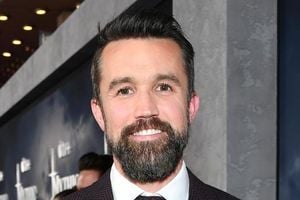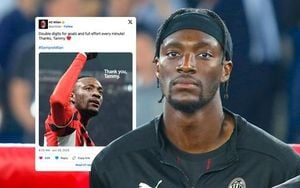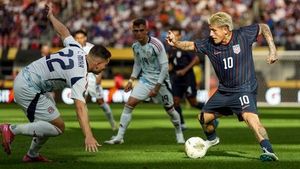Paris Saint-Germain delivered a commanding performance against Inter Miami in the 2025 FIFA Club World Cup Round of 16, cruising to a 4-0 victory at the Mercedes-Benz Stadium in Atlanta. The match marked a poignant reunion for Lionel Messi, who faced his former club PSG, where he played from 2021 to 2023, and went head-to-head with several familiar faces including coach Luis Enrique, Jordi Alba, Sergio Busquets, and Luis Suárez.
The French champions wasted little time asserting their dominance, opening the scoring just five minutes into the game. Joao Neves expertly headed in a free-kick delivered by Vitinha, beating Inter Miami goalkeeper Oscar Ustari despite his best efforts to keep the ball out. From the outset, PSG's high pressing and fluid attacking play unsettled the American side, leaving Inter Miami struggling to find their rhythm.
PSG's second goal came at the 39th minute following a critical turnover. Bradley Barcola stole the ball from Sergio Busquets and quickly combined with Fabián Ruiz, who set up Joao Neves for his second goal of the night. This goal highlighted the vulnerabilities in Inter Miami's midfield and defense, as the Spanish midfielder and young Brazilian winger exploited the gaps with precision.
Just before halftime, the scoreline was further stretched when a dangerous cross from Désiré Doué deflected off Inter Miami defender Tomás Avilés, resulting in an own goal that handed PSG a 3-0 lead. Avilés, who had been brought on as a substitute for Noah Allen due to an injury, was caught off guard by the cross, an unfortunate moment that compounded Inter Miami’s woes.
PSG capped off their dominant first half with a fourth goal deep into stoppage time. Achraf Hakimi was the man to finish the move after a rebound off the crossbar fell kindly to him in the box. His clinical finish underscored the clinical nature of PSG’s attack and effectively sealed the match before the break.
Throughout the first half, Maximiliano Falcón, the Uruguayan defender for Inter Miami, had a particularly difficult time. He lost his mark on Joao Neves for the opening goal, failed to intercept critical passes, and appeared disoriented in the defensive line. Fans were vocally critical on social media, with many questioning his suitability at this level, reflecting the struggles Miami faced in containing PSG’s relentless offense.
Despite the heavy deficit, Inter Miami, under the guidance of coach Javier Mascherano and led by Lionel Messi, showed resilience in the second half. Messi, who had a notable moment with a header saved by Donnarumma, tried to spark his team’s offense but was unable to convert any chances into goals. The team pushed forward with determination but ultimately could not breach PSG’s well-organized defense.
The match was officiated by a Brazilian FIFA referee, experienced in handling high-profile games and having previously overseen several matches involving Lionel Messi. The officiating crew included assistants Bruno Boschilia and Bruno Pires, with Mustapha Ghorbal as the fourth official. The VAR team consisted of officials from Colombia, Uruguay, and Mexico, ensuring a high standard of refereeing for this pivotal encounter.
PSG’s starting lineup reflected Luis Enrique’s tactical approach, deploying a 4-3-3 formation with Gianluigi Donnarumma in goal, supported by a defensive line featuring Achraf Hakimi, Marquinhos, Willian Pacho, and Nuno Mendes. The midfield trio of Vitinha, Joao Neves, and Fabián Ruiz orchestrated the play, while the forward line included Désiré Doué, Bradley Barcola, and Khvicha Kvaratskhelia, all contributing to the team’s dynamic attacking threat.
Inter Miami lined up in a 4-4-2 formation with Oscar Ustari guarding the net. Their defense comprised Marcelo Weigandt, Noah Allen, Maximiliano Falcón, and Jordi Alba, while the midfield featured Sergio Busquets, Federico Redondo, Telasco Segovia, and Tadeo Allende. Upfront, the attack was spearheaded by the legendary Lionel Messi alongside Luis Suárez, aiming to capitalize on their experience and chemistry.
The result means PSG advances confidently to the quarterfinals, where they will face Palmeiras on Friday, July 4, at the Lincoln Financial Field in Philadelphia. This upcoming clash promises to be a thrilling contest between two of the most technically gifted sides in world football.
For Inter Miami, the defeat is a sobering end to their Club World Cup journey. Despite the loss, the team showed flashes of promise, particularly with Messi’s leadership and the midfield’s work rate. However, defensive lapses and the inability to respond to PSG’s early onslaught proved decisive.
Fans and analysts alike will recall this match as a demonstration of PSG’s prowess on the global stage, reaffirming their status as reigning European champions. Meanwhile, Inter Miami will need to regroup and address their defensive frailties if they hope to make a deeper impact in future international tournaments.
In all, the 4-0 scoreline at halftime set the tone for a one-sided affair, with PSG’s clinical finishing and tactical discipline leaving no room for doubt. The second half saw a more measured approach from the French side, conserving energy while maintaining control, as Inter Miami pushed forward in vain.
As the tournament progresses, PSG’s blend of youthful exuberance and experienced stars like Hakimi and Neves will be key assets. Their quarterfinal showdown against Palmeiras will be closely watched by football fans worldwide, eager to see if PSG can continue their march toward the Club World Cup title.

![[VIDEOS] PSG puso el título de goleada con una ráfaga contra Inter Miami](https://thumbor.evrimagaci.org/zL49zWUDomjxQWacoj8xFd0PcwA=/200x0/tpg%2Fsources%2Ff67ae8f9-796b-439d-81da-752b55079bc3.jpeg)



